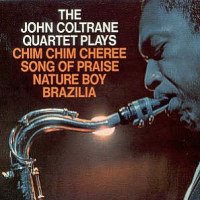JOHN COLTRANE The John Coltrane Quartet Plays
 Impulse! A-85 (1965)
Impulse! A-85 (1965)Here's an album recorded during John Coltrane's transitional phase from traditional jazz and bebop into the more experimental sounds he would pursue up until his death only two years later. At the time, Coltrane was developing his trademark "sheets-of-sound" style, in which he would play rapid-fire arpeggiations that sometimes had little to do with the harmonies of the piece on which he was improvising. Coltrane was listening to and being influenced by avant-garde jazzers such as Ornette Coleman and Albert Ayler and was looking for a way to express his emotions directly from his horn, and if traditional jazz harmonizations had to be abandoned along the way, so be it.
The album consists of two Coltrane originals and two unlikely standards; "Chim Chim Cheree" is indeed the chimney-sweep song from the film Mary Poppins, and, as he did earlier in his career with The Sound of Music's "My Favorite Things", Trane takes the song into unexplored sonic territory, using the mournful 6/8 melody as a basis for some extended soprano improvisations. "Brazilia" finds Coltrane once again on tenor and is a typically loose but hard-swinging later-Trane tune with little if any harmonic progression but plenty of rhythmic drive from all the instruments.
Side two opens with the popular ballad "Nature Boy"; Trane plays the melody over drummer Elvin Jones' cymbal washes and muted toms and McCoy Tyner's elegant stacked-fourth piano chords before the group ventures into free territory. This track is augmented by a second bassist, Art Davis, who here plays with a bow, creating a nice contrast to Jimmy Garrison's plucked lines (Ornette and Ayler frequently used two bassists in this fashion in their own groups). The album closes with "Song of Praise", which begins with a solo from Garrison (during which he strums his bass like a guitar) and builds slowly to a quiet but passionate climax.
Coltrane covered a lot of musical ground during his all-too-brief final years, and The John Coltrane Quartet Plays is an excellent jumping-off point in either direction of his development, containing elements of both his earlier bop and ballad style and of his later free-form work.


1 Comments:
I love this LP, I can't get enough of anything Trane did in 1965. Genre is irrelevant, it's all down to the enormous quantity of emotion that he managed to squeeze out of his horn. Truly remarkable.
Post a Comment
<< Home